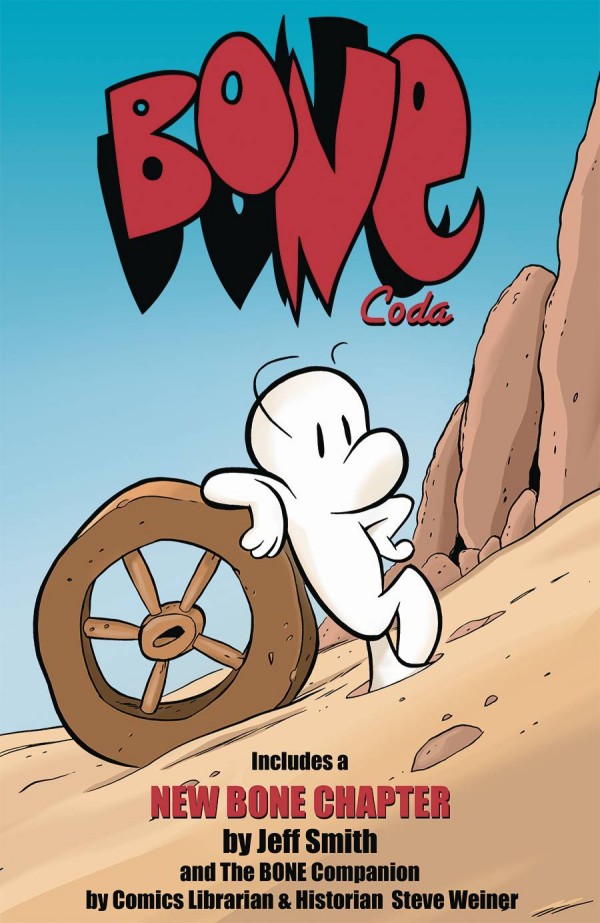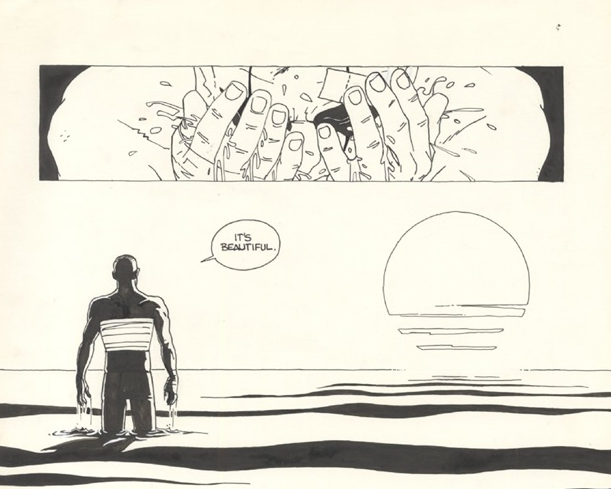 Written by Robert Venditti
Written by Robert VendittiIllustrated by Brett Weldele
Top Shelf
So if you haven't read Surrogates yet, I'd recommend you read that one first before opening this one up. First of all, that's going to give Top Shelf more money, which they totally deserve. Secondly, it will help you appreciate this prequel all the more.
That's not to say that Flesh and Bone does not hold its own as a story. If it required the first to make it work, then I would not have liked it as much as I did. However, there's a notable amount of weaving between the two and I would hate for a new reader to miss them by trying to read the story in chronological order.
As a rule, I do not like prequels. I always feel like they're constrained by what has come before. There's only so far to grow because otherwise, it will conflict with what we already know.
In the case of Flesh and Bone, however, there's a definite feeling that this was a story that Vendetti and Weldele already wanted to tell and left clues to it in the first book for when they were ready to put the work on paper.
Flesh and Bone takes us back to the time when surrogates were just getting off the ground, and, as with any new technology, no one was ready for the implications the new creation would have on society. When a spoiled brat takes his father's unit out for a spin and ends up going a bit too far, it's time for the law to step in. But how?
That's where a young patrolman named Greer comes into the picture. On the scene of the crime, Greer shows his prowess and soon is given a larger role as the case escalates further, into issues that combine race, class, and humanity into one very powerful problem. Before he knows it, Greer is in over his head as long-term frustrations boil over into a riot unlike those that came before.
When all is said and done, a day of reckoning is pushed back into the future, an everyone is happy...for now.
Unlike the first Surrogates, this story is not a mystery. Vendetti lays the facts before the reader and helps to fill in some of the clues hinted at in the original volume. We get to see Greer's wife as an early adopter of surrogate technology, explaining much. VSI's corporate mechanations are on display as well, with several tense conversations that provide a backstory to the goings-on in Surrogates. The Prophet is here, too, and he doesn't come off any better than most charasmatic preachers of our own time, too, and might even share a common background.
Those are just a few of the links between the two stories, and they're in there to remind us this is part of a series. However, they act more like "Aha!" moments than detractors from the main storyline, which reminds me quite a bit (in a good way) of watching a television drama like Homicide.
We have Greer (the new, idealistic cop) working with a seasoned veteran and seeing first-hand how the legal system can be twisted by those with power. There's also a DA who might blink in the face of skimpy evidence, corrupt defense attorneys, and pages upon pages of boiling anger waiting to be exploded into the climax.
But at the same time, things can work out in the end, as long as you don't forget your aim. It's a lesson Greer clearly kept with him, as I think the idea of doing the right thing is a strong part of his character in both narratives.
As with the first story, Vendetti does a great job of setting the tone with his dialog. While this is not a noirish detective story, he still uses his characters' words to paint an atmosphere where the world is just fine--as long as you don't make any waves. There's also a slightly lighter tone to the story. Characters are a bit more flippant, one scene is written entirely for laughs (and a few others are definitely written to be darkly humourous), and the whole picture is that of a time that doesn't have the onus of years of surrogate lifestyle to dull its senses.
Weldele's pencil work also has a lighter touch. His coloring patterns are less oppressive, chracters's eyes are just a bit wider, and the whole thing feels more open than the world Georgia is headed for in just a few decades. (I still wish his pencilling work was just a bit more structured, however. The multiple crowd scenes in this one all feel to me as though they could have used a bit more time. I know that a stylistic choice, it's just one I'm not a big fan of.)
Overall, there is less of a feel of failed humanity and more of a humanity that isn't sure what choice to make. That makes it less Philip K. Dick in tone and maybe more like a Twilight Zone episode where you can't tell if this reality is better or worse than the one we live in. For some, this shift in writing style may put them off, but I think it's Vendetti changing his voice to meet the story, not the other way around.
No one in this story, except maybe the Prophet, has an handle on where things are going. The police don't even have surrogates yet (in a move that mirrors underfunded cops in our own time), the law doesn't have a way to link surrogates to their owners, and everyone is making judgements based on old rich-poor/black-white arguments that are soon to be moot once body style is just a mail-order away. (This is even discussed as part of the storyline, which I greatly appreciated.)
Overall, I think Flesh and Bone is a very good story that, thankfully, does not try to merely immitate its predecessor. Vendetti changes the plot, the pacing, and the writing style to give us a more detailed look at the players involved. The plot is still important, but it's not the focus, because we already know how the story ends. That means the characters, even if some of them (McEvoy, the lawyers) are used as stock actors, have to take center stage--and they do. If we need to focus on the interaction between Greer and a a stoolie, we'll get a great set of dialog that helps us understand the Greer of Surrogates. Even Weldele, while keeping the scenery familiar, uses color to change the mood and tone of the story this time out. About the only thing that stayed exactly the same (or maybe even better) was the quality of the supplimental material, particularly the application for a surrogate!
It was clear that there's a lot of territory to be mined from the world of the surrogates, and this prequel is a good start in that direction. I'd love to see more from Venditti and Weldele in this large sandbox, perhaps a sequel to show life after the events of the first book, now that we have a window into the world that came before it.
If you enjoyed Surrogates, definitely pick a copy of this up. You'll be glad you did.







